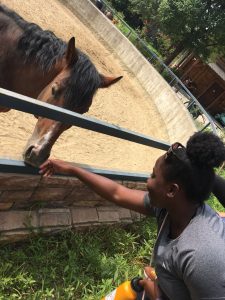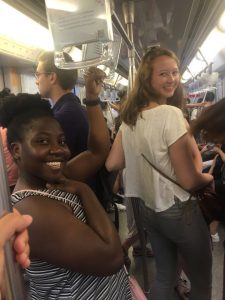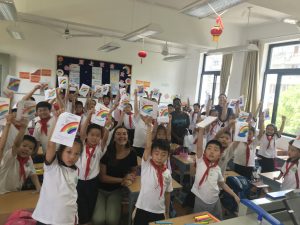This is the forth in a series of blog posts from Whitties studying on Whitman’s Crossroads: Shanghai, China: Second Language Acquisition in China and the USA program this summer with Professor Lydia McDermott. Laurinda Nyarko ’19 is a Chemistry Major.

A satisfied me petting a cute horse at a ranch at Anhui.
The journey to petting this cute horse has not been an easy one J. As cliché as it may sound, our first week here was indeed a roller coaster of emotions as we tried to find food on our own, endured the numerous stares from people as we walked through town and wobbled through large crowds on the streets to get to class or to get on the metro. Whether it was getting on the train real fast to grab a seat or walking with confidence to cross the street and ignoring the Moped drivers who seem to disobey every traffic rule, I like to believe we are learning to survive the Shanghainese way.

A happy me and Madi on the metro
The most challenging part of being in this city is the language barrier which I cannot say is getting better, but I definitely keep trying to practice whenever I have the opportunity to.
Me: “Nihao! Wo yao bing shui.”- I want ice water.
Seller: Says something else in Mandarin…
Me: “Ah, I don’t speak Chinese.” (With a lot of hand gestures)
This is how successful I usually am in carrying out a conversation to ask for or buy something in Mandarin. This inability to communicate in Mandarin proved to be even more challenging in our classrooms. As part of our program, we’ve taught four English lessons each in groups of three at a migrant Elementary school in Shanghai and a boarding school in a poorer province, Anhui, which was about a four-hour drive from Shanghai. Migrant schools are something that I only heard of in this city and the need for them is something I find very interesting.
So, in China, unlike in the US or Ghana, my home country, a child cannot attend elementary, middle or high school in a district where their family does not have a Hukou- an official document that every family owns to prove that they are residents of a certain province or city. Through the lectures and interactions with people, I’ve come to understand that this system is one way by which the government hopes to control urban migration. Thus, the creation of migrant schools in Shanghai is to provide an education for those kids whose parents still move to the city to find better jobs. However, these children will eventually go back to their hometowns if they choose to write any national entrance exams as one can only register for the national exams in the district where their family has a Hukou. Very interesting…
One of our teaching activities at the migrant school was a rainbow coloring activity after we had taught them the colors. It was such a fun activity because we got to walk around the class and interact with the kids one-on-one while they worked, and they also got to apply their knowledge of the colors in a fun way. During this activity on our first day of teaching, a girl who had not spoken during the whole lesson raised her hand to ask me something. As I bent over her desk, she started to speak to me in Mandarin. Once again, with elaborate hand gestures, I tried to explain to her that I could not understand her. She kept repeating what she was saying and I kept gesturing that I did not understand. After about a minute, she sighed and turned back to her work and I walked away quietly and completely frustrated with myself for my inability to help her with whatever it was she needed because we did not share the same language. Had I understood what she was saying, I could have helped her put that in English and she would have learned something new. I could only think of all the things I could have learned from them and all that they could have asked and learned about if we understood each other better.
Although there were other moments like that, that was not the entirety of our teaching experience. There were so many other things that I loved and valued about the time we spent teaching these kids English and would do it again. Their enthusiasm and willingness to engage with us, even if it was just to say “Hello” or “Bye-bye” or “See you” always made me look forward to the next lesson. Their determination to seize the opportunity to practice their English whenever, made me want to practice my Mandarin whenever I could. When we arrived at the elementary school at Anhui, our walk from the front gates to the dining hall was filled with little voices saying hello and little hands waving from different places. They did not know us, and we did not know them but their genuine excitement to see us was a moment I will forever cherish. Whenever I waved and said hello back, they responded with wide smiles that always made me smile too.

Mariah, Lauren and I with the second graders at the migrant school who are proudly showing off their colored rainbows.
I haven’t succeeded in having a full conversation in Mandarin yet, and I would never know what that little girl tried to tell me in the class that day but I am grateful for the opportunity I’ve had to come to appreciate a culture and a people that are very different from mine. As my language exchange friend said (re-phrased), we become better versions of ourselves by gaining a better understanding of the world around us through experiencing and engaging in different cultures. I couldn’t agree more.



